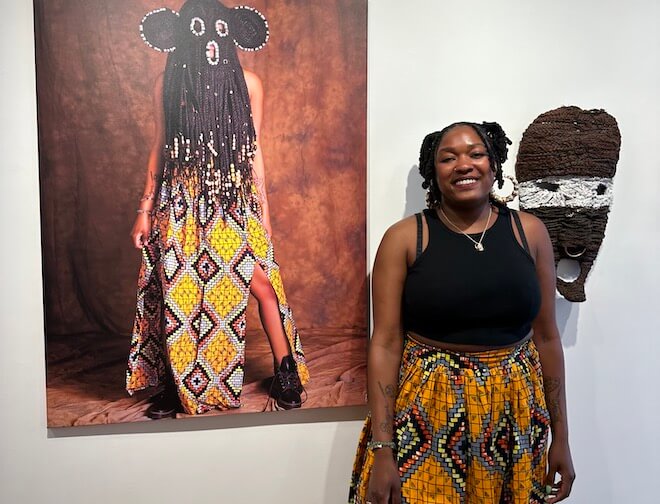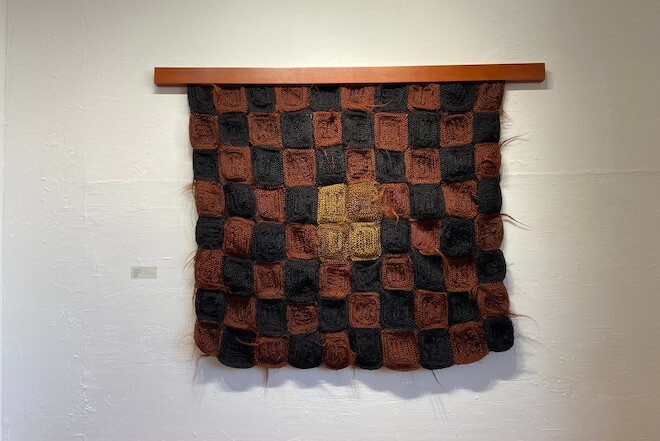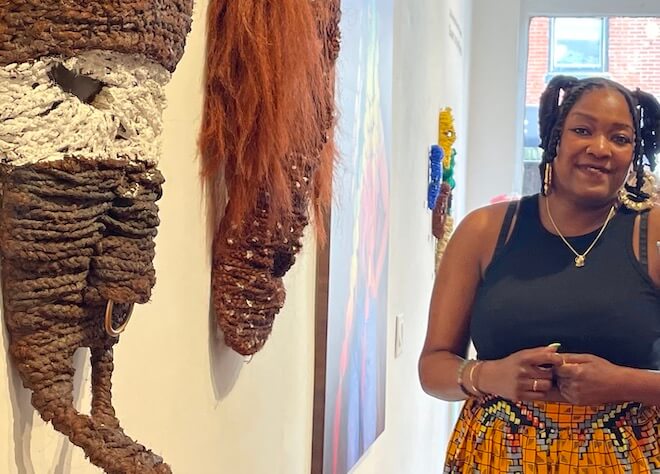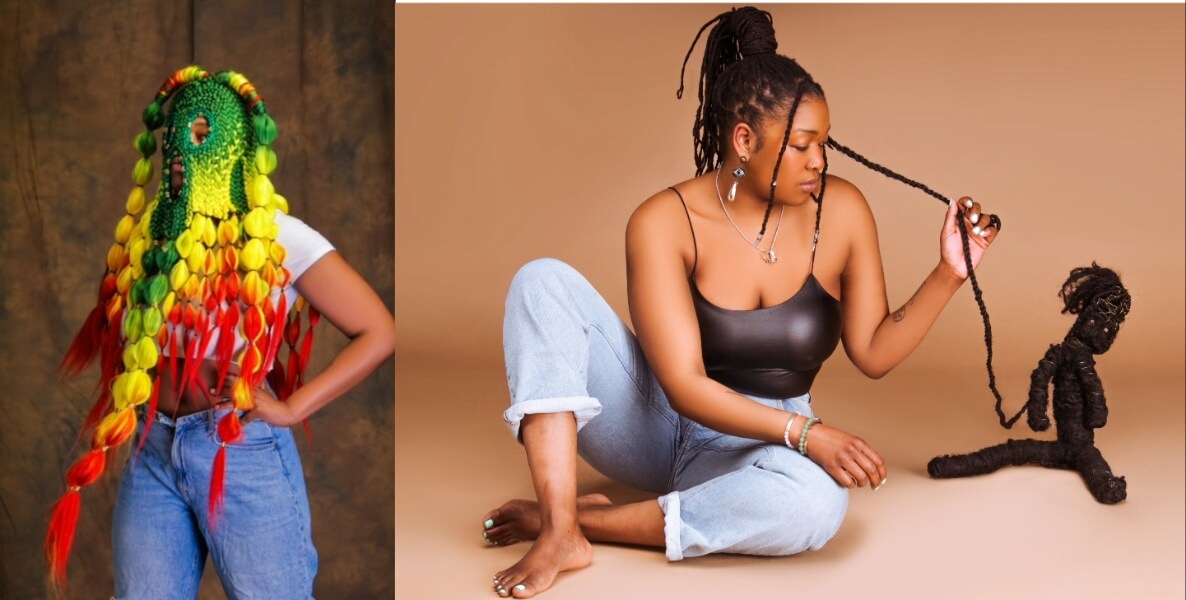During a December performance at the Pratt Institute in Brooklyn, DeJeonge Reese emerged from behind a room divider wearing a traditional African mask made from Black hair and beads that clicked together as she changed into business casual clothing. Think: khaki pants, loafers, a blazer.
Once dressed, she looked in the mirror, her shoulders slumped. Feeling depleted, the character realizes: “I can’t go to work like this, or I can’t go to this interview dressed like that because they’re not going to accept my natural hair,” Reese says.
The performance is indicative of Reese’s broader body of work, which fashions masks, sculptures, quilts, bowls and other works from Black hair — a way to make a statement about hair’s rich cultural history and the discrimination Black women have faced (and still face).
Now, more Philadelphians are getting a chance to view her groundbreaking work. This February, Reese exhibits at the Ubuntu Fine Art gallery in Germantown, part of a show highlighting the work of the 2023 Mural Arts Fellows for Black Artists.

From ceramics to hair
Reese has loved art since her first ceramics class in high school. Growing up in Delaware County near Cobbs Creek, she didn’t know many working artists, however, and it was difficult to envision art as a career path.
So, like many budding artists, she decided to pursue something more practical in college. At Lincoln University, she first studied psychology, then dropped it after a semester. Then it was mass communications. All the while, she kept taking art classes. She completed half the major without trying, finally committing to studying visual art in her junior year.
At Lincoln, she continued with her passion for ceramics but wanted to explore new mediums. What could she do with paints? Dyes? Performance art? She applied for a master’s degree in studio arts at Moore College of Art & Design. There, she began working with different materials and started thinking about the broader meanings behind her work.
While in school, she had begun locing her hair and reflecting on how she didn’t know much about the history of Black hair. She remembered learning about Madam C. J. Walker, the Black millionaire and entrepreneur who made her fortune in cosmetology and haircare products, but that was about it. Ads for beauty products and clothing rarely featured women with natural hair.
The lack of representation frustrated Reese.
“DeJeonge’s work on display is an opportunity to champion conversations about lineage, culture, and the evolution of this artistry.” — Ginger Rudolph, curator
Maybe, she thought, she could address these issues through her art. “I was going through my own discovery of self when I decided to make hair art,” Reese says. “I didn’t have any real knowledge about natural hair and the history of it. So I just started doing my own research and that ended up folding more into my practice.”
She created a performance piece where she looked in a mirror and acted out trying different hairstyles. Her goal was to emphasize how Black women are often discriminated against for how they choose to wear their hair.
For her thesis, she created an installation that was part beauty salon, part Little Shop of Horrors-style laboratory, emphasizing the damaging chemicals found in many beauty products. She hadn’t begun making works from hair yet but was circling similar themes. “I was looking at hair and in relation to beauty and body images around women of color and those general standards,” she says.

Honoring the history of Black hair
It was in 2018 when Reese began incorporating sculptures made from hair into her artistic practice. At the time, she was working part-time at the Barnes Foundation and dabbling with making small trinkets from hair when she stumbled across a mask in the museum’s African Art collection.
She thought about how masks were used in certain tribal cultures to delineate everything from age and rank to marital status. Hairstyles carried a similar cultural weight. “Hair was like your walking identification card,” she says. “I kept thinking of how that [history] plays a part in society, in our culture, today with how important our hair is to us.”
Reese decided to combine the two. She purchased some hair from a beauty shop and began braiding it to make her first mask.
When people think of hair art, many think of the Victorian period. High infant mortality rates and Queen Victoria’s long public mourning for her husband, Prince Albert, inspired many to save locks of hair from their deceased loved ones. The hair was then looped into wreaths, braided into flower petals or fashioned into jewelry.
Today, artists like Reese have used a similar practice to honor the history and culture associated with Black hair. Her work begins with traditional African hairstyles and moves through the ways Black hair was used for survival during slavery before looking at modern discrimination over hair.
“The landscape of artists using hair to address and celebrate themes of identity, politics and discrimination has been widening for decades,” says Ginger Rudolph, co-curator of Mural Arts’ Black Artist Fellowship program.
“I find it courageous to [see her] use her art to reclaim heritage and publicly celebrate Black beauty. DeJeonge’s work on display is an opportunity to champion conversations about lineage, culture, and the evolution of this artistry.”
Reese began researching the cultures of Nigeria, Cameroon and Congo and making masks based on their traditions, moving on to larger works using hair dyed with bright colors. Starting with masks designed to hang on a wall, she branched into wearable art. So far, she’s made over 20 pieces from hair, mostly masks but also a quilt. Last year, she held her first solo show at Philly’s Muse Gallery in Old City and was also part of the group show Hairitage at Pratt Institute in Brooklyn.

Becoming a Mural Arts fellow
Last March, Reese decided to apply to the 2023 Mural Arts Fellowship for Black Artists to continue her work. She was selected as one of 15 fellows in April. The fellowship connects artists with career development and exhibition opportunities, introduces them to curators, and provides them with $2,000 in unrestricted funding to support their work. It’s a relatively small amount — certainly not enough to cover a year’s rent on a studio — but it can help artists purchase materials or fund residency costs to support their work.
“Hair was like your walking identification card.” — DeJeonge Reese, artist
Rudolph says that they were interested in Reese’s work because of its unique medium and its connection to historic and contemporary social justice issues. She points to the movement to try to get states to pass the CROWN Act, which prohibits discrimination based on hairstyle and texture, as one of the many ways Reese’s art and the conversation it sparks around Black hair is relevant. (A 2023 survey from CROWN Workplace Research found more than half of Black women felt they needed to wear their hair straight for job interviews. One-fifth had been sent home from work because of their hair. Pennsylvania passed its own version of the CROWN Act last year.)
“I love the hair masks,” says Rudolph. “Their essence is lifelike. When DeJeonge wears them in her artistic performances, they become transcendent vessels — embodying the wearer while breathing the vestiges of our heritages out at us through a veil of this century’s emotional trauma and joy.”
The fellowship has helped Reese connect to other opportunities. In addition to the Mural Arts Fellowship show at the Ubuntu Fine Art gallery, Reese has been accepted for a summer residency at the Virginia Center for the Creative Arts. By the end of the year, some of her wearable hair masks and other works will also be on display at the Philadelphia Airport’s A-West terminal. Her work will also go on exhibit at City Hall as part of the Women’s Caucus for Art’s (Re)FOCUS series that honors the 50th anniversary of the 1974 feminist art exhibition, Philadelphia Focuses on Women in the Visual Arts.
Reese plans to use these opportunities to continue creating works made of hair. Right now, she’s creating a series of small bowls inspired by the history of enslaved women braiding rice and other small grains into their cornrows so that they would have food for themselves and their children, first during the Middle Passage, and later, as many planned escapes out of enslavement. “They were using their hair as a literal vessel for a means for survival,” Reese says.
She’s also intrigued by the idea of making a map from hair to honor enslaved people who braided maps into their hair to escape slavery. “The more I continue to learn about my own natural hair, the more I continue to learn about Black hair, culture and history of Black hair throughout different times … The more I get inspired to make new work,” she says.
![]() MORE ON THE ARTS FROM THE CITIZEN
MORE ON THE ARTS FROM THE CITIZEN




